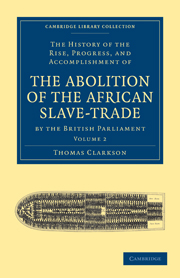Summary
The question had now been brought forward in almost every possible way, and yet had been eventually lost. The total and immediate abolition had been attempted; and then the gradual. The gradual again had been tried for the year 1793, then for 1795, and then for 1796, at which period it was decreed, but never allowed to be executed. An abolition of a part of the trade, as it related to the supply of foreigners with slaves, was the next measure proposed; and when this failed, the abolition of another part of it, as it related to the making of a certain portion of the coast of Africa sacred to liberty, was attempted; but this failed also. Mr. Wilberforce therefore thought it prudent, not to press the abolition as a mere annual measure, but to allow members time to digest the eloquence, which had been bestowed upon it for the last five years, and to wait till some new circumstances should favour its introduction. Accordingly he allowed the years 1800, 1801, 1802, and 1803 to pass over without any further parliamentary notice than the moving for certain papers; during which he took an opportunity of assuring the House, that he had not grown cool in the cause, but that he would agitate it in a future session.
In the year 1804, which was fixed upon for renewed exertion, the committee for the abolition of the Slave-trade elected James Stephen, Zachary Macaulay, Henry Brougham, esquires, and William Phillips, into their own body.
- Type
- Chapter
- Information
- The History of the Rise, Progress, and Accomplishment of the Abolition of the African Slave-Trade by the British Parliament , pp. 489 - 500Publisher: Cambridge University PressPrint publication year: 2010First published in: 1808

